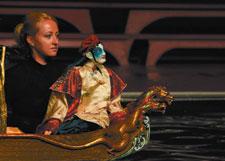He’s directed what’s heralded as the most expensive theatrical production ever staged, Cirque de Soleil’s Kà in Las Vegas, a multimedia extravaganza with giant moving, totally flexible performance areas. But his next production does away with all the high-tech wizardry, at least visible on stage, in favour of the simplest of stage crafts, puppetry — hand shadows, shadow puppets, Taiwanese glove puppets, Vietnamese water puppets and Japanese Bunraku puppets.
Sixteen years after directing the Canadian Opera Company’s startling double bill Bluebeard’s Castle and Erwartung — the first operas he ever directed — gay Canadian playwright and director Robert Lepage returns to the COC for the world premiere of The Nightingale and Other Short Fables by Igor Stravinsky.
Puppets notwithstanding, nothing is ever simple with Lepage. The Nightingale, a coproduction with Festival d’Aix-en-Provence, Opéra National de Lyon and Lepage’s company Ex Machina, is another massive undertaking, with 67 tonnes of water pumped into the orchestra pit and most singers performing waist deep while operating puppets designed by Tony-winner Michael Curry.
“To fill the pit we had to empty it, of course, of its orchestra,” says Lepage, deadpan. The orchestra will be arrayed onstage, visible to the audience. The set is designed by Carl Fillion, a frequent Lepage collaborator (The Damnation of Faust at Opéra Bastille and the forthcoming Ring Cycle at the Met).
Based on a fairytale by Hans Christian Anderson, The Nightingale is a short opera about the emperor of China (sung by bass Ilya Bannik) who becomes entranced with a songbird (soprano Olga Peretyatko). When Japanese emissaries arrive with a singing mechanical bird the Nightingale flies off so, in turn, the Emperor banishes her. Years later the Nightingale returns when the Emperor is dying. She beguiles Death (contralto Maria Radner) with her song, saving the Emperor’s life.
Stravinsky began composing the opera around 1908 but didn’t finish it until 1914, having written The Firebird, Petrouchka and The Rite of Spring for the Ballets Russes in the interim. So Nightingale charts Stravinsky’s shift from a late-romantic style to more avant-garde. The conductor is Jonathan Darlington, principal conductor at Vancouver Opera.
The first half of the COC program features Stravinsky’s The Fox from 1916, more of a troubadour piece than an opera, about a bully of a fox who gets her comeuppance. The piece is fleshed out with other musical selections written during the same period. A giant scrim fills much of the stage onto which the shadows of puppets and tumblers are projected. A gap below the scrim allows audiences also to see the singer puppeteers and tumblers.
“There are no strings with these puppets,” says Lepage, “but this is a production that shows all the strings. It’s very simple. Part of the poetry of the piece is that everything is exposed.”
The giant pool and the various types of puppets grew out of Lepage’s take on chinoiserie. “This has nothing to do with the real Orient,” he says. “It’s a version of the Orient that grew out of 19th-century European romanticism. And Anderson’s Danish version is very watery.
“And there is a baroqueness to the piece, with Chinese and Japanese ambassadors all singing in Russian,” says Lepage who adds to the cross-cultural cauldron theatrical traditions from across east and southeast Asia.
None of the creative team know how this is going to come together yet, how all that water might affect the acoustics once the set is moved into the Four Seasons Centre. Even the play of light on water guarantees that no one show will look like another. The wild card of water appeals to Lepage who repeatedly applauded the risk-taking efforts of the 60-year-old COC at a recent press conference.
“Risks are something the COC does very well. It’s a young company with a young man at its helm,” nodding to the COC’s new general director Alexander Neef. “Canada is a young country. We can take good old arts disciplines and take them someplace else.”
The three men at the centre of that press conference made a fascinating tableau. The conductor Darlington, with his dashing manner and lion’s mane, mischievously teasing Lepage, the elfin visionary, over the huge technical and staging difficulties The Nightingale presents, with Neef in the middle, buttoned-down, impeccable suit, looking too young and too cute to run an opera company, an impish Mona Lisa smile always on his face. Like he has a secret… or the only North American run of what promises to be a wholly unique piece of musical theatre.


 Why you can trust Xtra
Why you can trust Xtra


